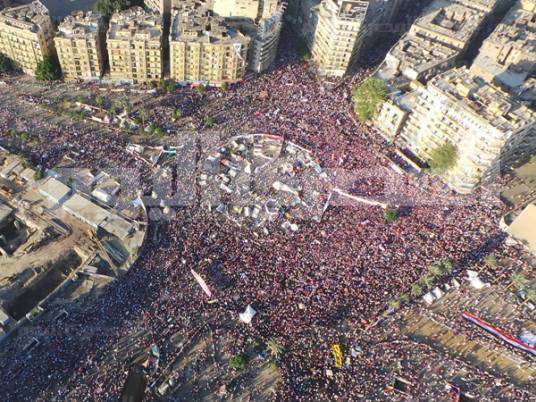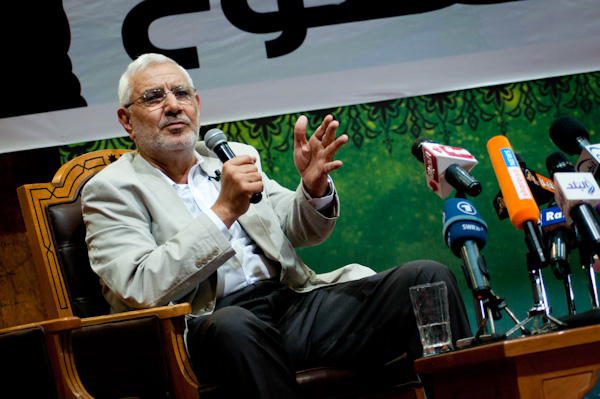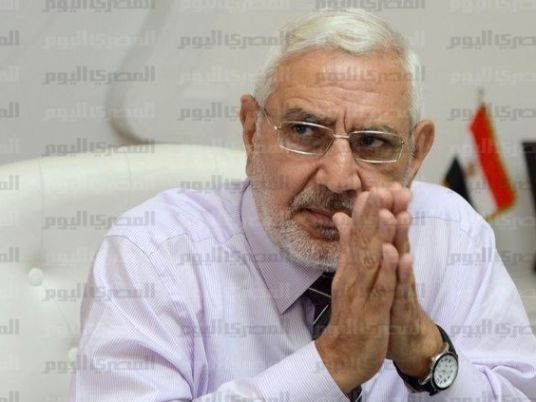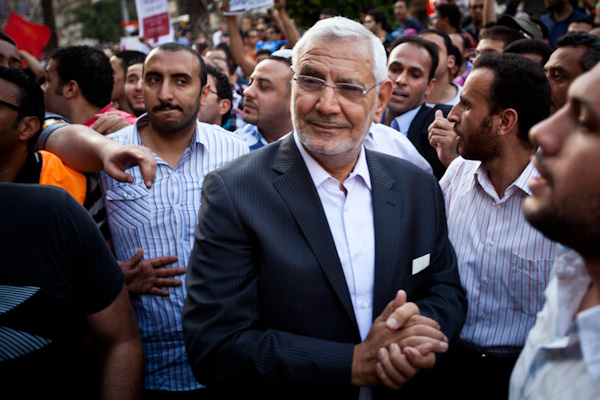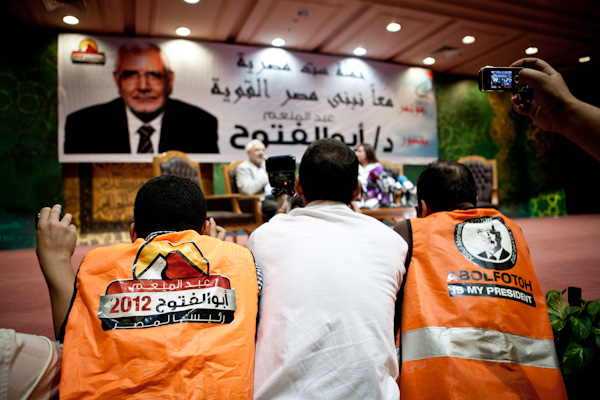
Outside Abdel Moneim Abouel Fotouh’s campaign headquarters, a fast food delivery man is getting ready to deliver around 50 lunch boxes to a bunch of tired young campaigners. After working hard promoting their candidate for well over a month, the campaign staffers, many of them young, now have to cope with the disappointment of Abouel Fotouh not making it to the second round and the fatigue of working day and night.
“Most of us have not slept for at least three days,” said Mohamed, a young man wearing a t-shirt with a caricature of a grinning Abouel Fotouh printed on the front. The drawing could not have stood in starker contrast to the morose expression on Mohamed’s and his fellow campaigners’ faces.
Abouel Fotouh, a longtime moderate member of the Muslim Brotherhood who left the group acrimoniously last summer, was considered a frontrunner until days before voting. In his campaigning, Abouel Fotouh constructed a campaign that was intended to have a broad appeal, posing himself as a kind of a consensus candidate who represented the ideals of the 25 January revolution. Public opinion polls in the weeks leading up to the election, though considered unreliable, showed Abouel Fotouh among the top two candidates, though he slipped to third in some of the most recent polls.
The strategy appears to have failed. In the voting, which stretched over two days, Abouel Fotouh received 17.8 percent of the vote nationwide, behind the Mohamed Morsy’s 24.9, Ahmed Shafiq’s 24.5 and Hamdeen Sabbahi’s 21.1.
“It’s not as shocking that we did not win. I am more shocked that [deposed president Hosni Mubarak’s last Prime Minister] Ahmed Shafiq is in the run-offs and that the old regime might be back because people are too afraid of change,” said Perihan Abu Zaid, a 27- year-old member of Abouel Fotouh’s unofficial campaign.
In her last week of campaigning, Abu Zaid thinks that many would-be Abouel Fotouh supporters decided against voting for him because they believed he was a more conservative Islamist than advertised. The hardline Salafi movement endorsed Abouel Fotouh earlier this month. In a debate against former Arab League head Amr Moussa two weeks ago, Abouel Fotouh repeatedly re-affirmed his commitment to implementing Islamic law if elected.
Abu Zaid believes that the campaign was too comfortable in the last period and failed to reach out sufficiently to propel their candidate into the runoff vote scheduled for 16 and 17 June.
“The campaign was sometimes too idealistic and believed people’s ideals would not change,” she said.
Other Abouel Futouh campaigners also believe the candidate’s performance and his campaign in the period preceding the elections is partially to blame for his unexpected loss.
“We were not active enough in outreach to some of the poorer areas which eventually went to Sabbahi or Shafiq. Abouel Futouh himself may have underperformed in his debate with Amr Mousa and some of his television interviews,” said Ahmed Suleiman, one of the founders of the liberal Islamist Tayyar al-Masry Party and a campaigner for Abouel Fotouh, speaking on his own behalf.
But it might have been more than just sluggish campaigning or less-than-inspiring performances that left Abouel Fotouh in fourth place. Attempts to build a diverse base of supporters may have stretched Abouel Fotouh’s image too thin.
“Sabbahi took many votes [away from Abouel Fotouh] because he began catering too much to some of the Islamist parties, seeming to look more like the Muslim Brotherhood candidate,” said Sherif Younis, a professor of history at Helwan University.
Younis believes that this “too broad” of an appeal, affected his performance when faced with some crucial and divisive questions, which may have alienated many of his voters.
Competition between Abouel Fotouh and Sabbahi over pro-revolution voters may have also handicapped both candidates, according to Sueliman and Abu Zaid. Combined, Abouel Fotouh and Sabbahi received 38.9 percent of the vote.
Now with a likely run-off between Morsy, the Muslim Brotherhood’s candidate, and Shafiq, many are wondering how they are going to resurrect their revolutionary hopes.
“Anyone who was a revolutionary in this campaign must now regroup and get back to working on how to make sure Shafiq does not win,” said Suleiman.
Abouel Fotouh himself released a statement on Friday night, after conceding defeat, to say that he would work on creating a unified revolutionary front to make sure Shafiq does not win.
“It is the least we have to do now to honor those who died for the sake of positive change in Egypt,” said Suleiman.
Now, besides the shock and disappointment of defeat, Abouel Fotouh’s campaigners have another reason to dust themselves off and get back to work again for the revolution.
“I won’t stay inactive long. Shafiq is actually in the run-offs,” Abu Zaid said. “Over my dead body he becomes president.”

